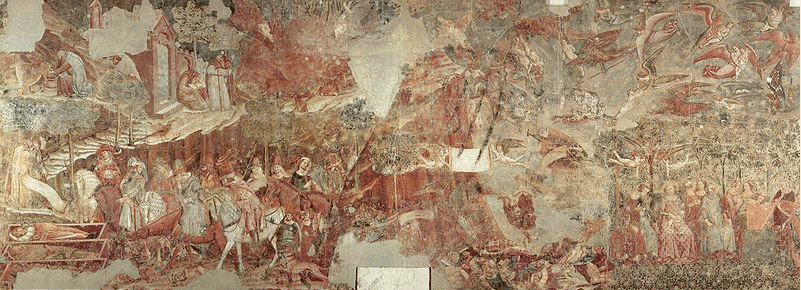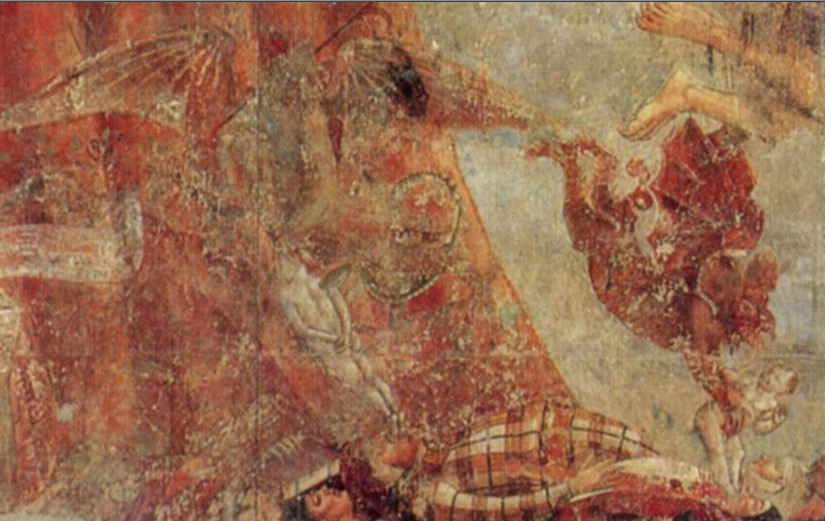Part III. Italy
Chapter 59. The Reckoning [July 27, 1349]
Cultural Explanations
 |
Part III. Italy Chapter 59. The Reckoning [July 27, 1349] Cultural Explanations |
|
| In this chapter Bávlos meets Catharina again and is freed. | |
|
In this chapter, Bávlos is rescued from his predicament by a surprise visit from the Lady Birgitta and her daughter Catharina. In the aftermath of the failed crusade against Novgorod, Birgitta packed up and left Sweden for good. Although the Swedes had some initial success in their attempt to displace and/or convert the Orthodox of Novgorod, their attempts eventually failed, possibly due to the onset of the Plague in the region. Birgitta blamed the military failure on Magnus's having paid mercenaries to join his army: her vision had clearly stipulated that only the most pious and worthy Swedish and Norwegian soldiers should go on the crusade and that priests should be along to convert the Orthodox if possible. Accounts of the war indicate that Magnus did indeed bring priests along, and engaged the Orthodox in debate, but that he also employed numerous mercenaries, chiefly because the Norwegian knights he had counted on failed to join his undertaking.
The year 1350 was to be a Jubilee year, and Birgitta left Sweden in 1349 to take up residence in Rome in preparation for the many occasions for receiving indulgences that the year would afford. The first Jubilee year had been declared by Pope Boniface VIII in 1300, and 1350 was the next logical date. Birgitta's daughter Catharina followed her mother to Rome a few months later, planning to stay only a little while before returning to Sweden and her husband. Her husband died, however, and Birgitta had a vision that Catharina should stay with her in Rome permanently. In the chapter, none of this is known to Catharina at this point, of course: in her conversation with Bávlos she indicates very matter-of-factly that she will be returning to Sweden in a matter of months. There are no accounts of Birgitta and Catharina actually visiting Pisa, but it would be hard to imagine that they did not, given the city's importance at the time and the holy sites it contained. Accounts of Birgitta's life detail her having visited many other Tuscan cities, so it is likely that she came to Pisa as well. When Catharina finally did return to Sweden, in 1373, she did so escorting the body of her sainted mother back to Vadstena, where Catharina established the order of nuns and priests that her mother had envisioned.


Detail. Demons capturing souls of the unworthy dead to take to Hell.
Bávlos and Catharina embrace in the ways common at this time: kissing was still a fairly aristocratic sign of affection in the fourteenth century, and Catharina's act shows her fine upbringing and international experience. Sámi people did not adopt kissing until quite recently: ethnographic accounts show Sámi of the first half of the twentieth century continuing the older tradition of pressing noses.
Bávlos and Catharina exchange the Sámi departure formula: "Mana dearvan" (Go in health; said to a person who is leaving); "Báze dearvan" (Stay in health; said to a person one is leaving behind). It is telling that their exchange indicates that Bávlos is staying while Catharina is leaving. In fact, both characters remain in Italy. Modern life does not always involve moments in which one person is clearly leaving and the other is clearly staying. Consider, for instance, a conversation on a cell phone--who is "staying," and who is "going"? To get around this situation, modern Sámi will say "Eale dearvan" (Live in health).